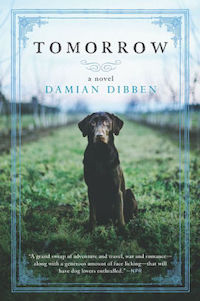AmateisGal
I'll Lock Up
- Messages
- 6,126
- Location
- Nebraska
I once wrote a novel set in 1944 Hollywood about a pilot shot down over Occupied France with his crew who worked with the French Resistance to escape, and of course, Hollywood wants to make a movie about it. I struggled to find books to tell me the inner workings of how the studio system worked to make a film, and this sounds like exactly what I should have been looking at!View attachment 301317
Inside Warner Brothers (1935-1951) by Rudy Behlmer originally published in 1985
The majority of Inside Warner Brothers is an incredible treasure of business memos and letters sent to and from the Warner Brothers themselves, top executives, producers, directors, agents and the studio's famous stars from the titular years of 1935-1951 (with a few from the pre-code era of '30-'34).
These letters and memos provide such a direct view into the workings of the studio that you feel like you're a Warner Brothers' exec getting cc'd on the major movie and business events happening at the company. Helpfully augmented by author Rudy Behlmer's periodic commentary that provides context or follow up, it's hard to imagine a better way to see how a major studio operated during the peak years of the studio system, which also overlaps with Hollywood's putative Golden Era.
You quickly learn how much of a business making movies really is as budgets, personalities, power struggles, egos and worrying about what the customer (the ticket-buying audience) wants dominates the memo flow. While artist considerations pop up, the real drive is to create, at the lowest cost possible, movie after movie that the public wants to see.
Inside Warner Bros. shows why "the studio system" is a good description for how the company operated. It broke the business of making movies down into its component parts and tried to standardize each one while maximizing efficiency by doing things like utilizing the same sets and props across many movies, limiting location shots and reusing the heck out of stories it had already paid for.
While that's neat stuff, the real fun of the book comes from the window into how some of your favorite movies got made or its reveals of the stars' personalities and foibles. Yes, the silliness is here, like Errol Flynn, who comes across as a pretty nice guy, hating the part in his long-hair wig in The Adventures of Robin Hood enough to write a wordy but thoughtful letter to Hal Wallis, the number two man at Warner Brothers (the wig got changed).
But you also see that actresses such as Bette Davis wrote intelligent and nuanced letters directly to studio head Jack Warner (stardom does have its privileges) on serious subjects ranging from whether a part was right for her to why she is willing to be "suspended" (not paid her salary because she refused to do a movie) owing to the unfairness of her contract.
However, star Humphrey Bogart comes across as an insecure cry baby who's vain and emotional. And while studio-head Jack Warner was, oftentimes, brutal, manipulative and dishonest, you wonder if you wouldn't start to pick up some of those traits if you had his insanely demanding job to do with many loudly complaining stars, directors, producers, censors and others firing missiles at you every single day.
Most enjoyably, we see those memo missiles flying around the making of classics like Jezebel, where there was much worry at the studio that it was too similar to Gone With the Wind. Now Voyager pops up, where it seems every actress was considered before Bette Davis (who killed it in the role). Even the noir classic The Big Sleep's confusing story was fretted over, but those concerns were put aside as Warner's movie-makers understood that good scenes and actor chemistry matter more to movie-going audiences than the story itself (see Hitchcock films for the apotheosis of this view).
Finally, when reading all the memos about the uber-classic Casablanca, you almost get nervous that they are going to screw it up as they consider other actors for the roles: George Raft for Rick, Hedy Lamar for Ilsa, Dean Jagger for Lazlo. They are all fine actors, but you don't change one brushstroke in the Mona Lisa.
The Casablanca angst ramps up more when you learn that executive producer Hal Wallis wasn't in love with Dooley Wilson for the part of Sam as all you want to do is scream "shut up Wallis, no one asked you." He also wanted the role of Sam changed to a woman, again, "shut up, Wallis."
While some of the memos can be tedious, overall, it's a heck of a trip through Golden Era Hollywood. It's not the book for a newbie, but for those reasonably familiar with the movies and stars of the period, it's an incredible insider's view of one of the defining studios of the day.
Maybe someday I'll pick that novel back up again...it was a fun story to write.
